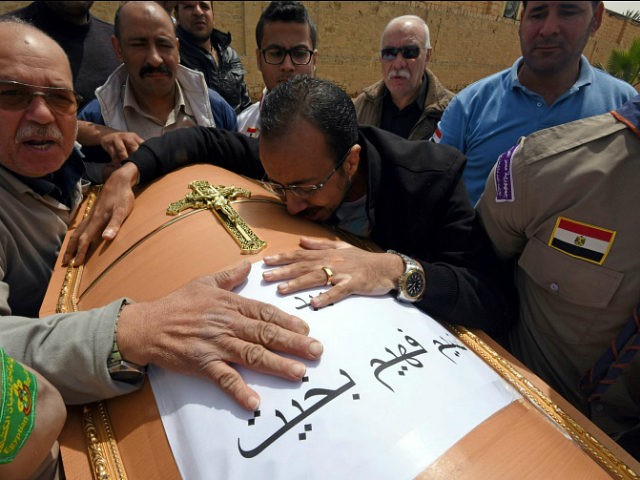Egyptian Christians are complaining about insufficient security after the horrific Palm Sunday bombing attacks, despite President Abdel Fattah al-Sisi’s promises to protect them.
Reuters quotes complaints from Coptic Christians that security at the church in Tanta was “almost non-existent” despite repeated warnings and an unsuccessful bombing attempt last week.
“That should have been an alarm or a warning that this place is targeted. Especially Palm Sunday, a day when many people gather, more than any other time in the year… I don’t know how this happened,” said a woman whose brother was injured in the attack.
Writing for CNN, freelance journalist Monique el-Faizy contends that Coptic Christians have been “badly let down again” by their government.
“During the years that the Morsi regime was in power, Copts were terrified, not only because of spates of sectarian violence, but also out of fear of a creeping Islamist takeover of the Egyptian state. When then-General Abdel Fattah el-Sisi moved to depose Morsi, arguably no community supported him more strongly than the Copts,” she recalls.
“With hindsight, one could say that their loyalty was misplaced,” el-Faizy contends. “Sporadic attacks on Copts continued, largely unpunished. High-profile incidents, such as that of an elderly Coptic woman being dragged through the streets of Minya last May, garnered media attention and government promises, but once the spotlight turned elsewhere, little changed.”
She sees the Copts as growing weary of the carnage and increasingly willing to criticize the Sisi government. “Everyone is saying, ‘Oh, again, again.’ We need more security,” a Copt in Cairo told el-Faizy. “Of course we are targeted, and of course the government knows we are targeted, so why don’t they protect us? We are feeling hurt and let down by the government.”
Even before the Palm Sunday bombings, hundreds of Christian families abandoned their homes in the Sinai after a wave of attacks from Islamist extremists, including the local ISIS operation. Some of the departing Christians said it was the “apathetic” response of Egyptian security officials to the violence frightened them into leaving.
President Sisi, freshly returned from a visit to Washington, offered assurances that Christians would be protected. He also must contend with the security problems posed by Pope Francis’s scheduled visit at the end of April.
The New York Times reports that Sisi declared a three-month state of emergency, which was largely symbolic “given that his government enjoys largely unfettered powers, has already imprisoned or exiled thousands of political opponents and oversees a Parliament that is dominated by his supporters.” There have been complaints he seems more intent on controlling news coverage than providing security.
“I think people will not only be too scared to be inside a church, they will be too scared to pass by one now. This will continue to happen because the state is not interested in protecting Christians, or anyone else for that matter. The police’s only job is to crush political opponents. They don’t care about the real terrorists,” Christian-rights activist Mina Mansy told the New York Times.
“The state of emergency means absolutely nothing to me. It means that people will get trailed for no reason and arrested with no warrants, but what does it do for the future of Egyptians? I personally do not feel safe to return to Egypt,” an Egyptian Christian currently living in Brussels told CNN.

COMMENTS
Please let us know if you're having issues with commenting.